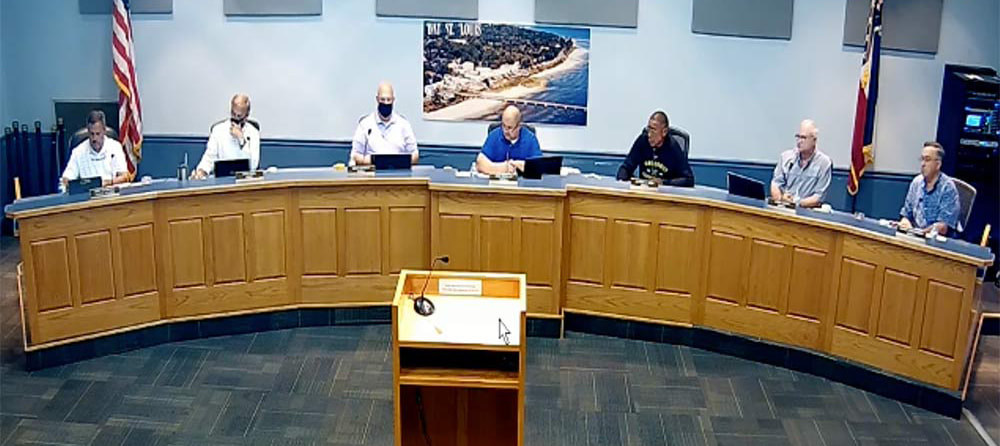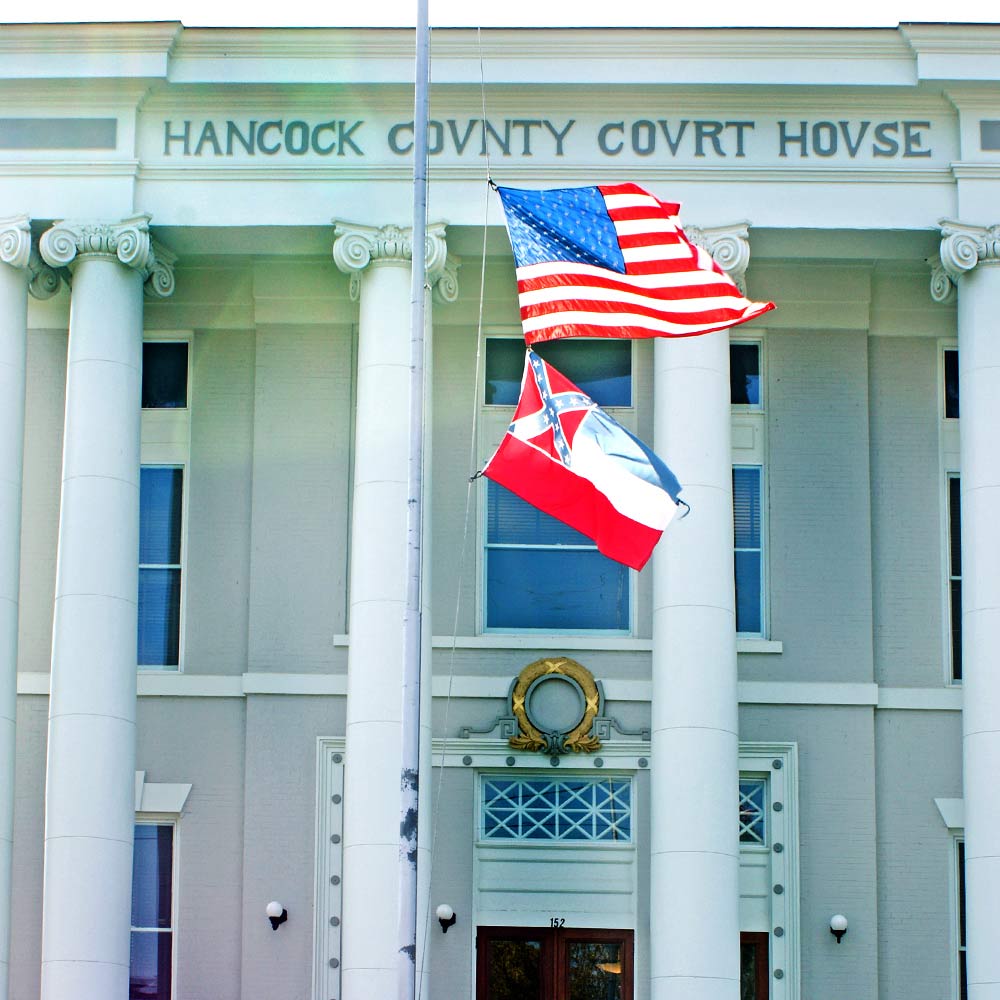A new national awareness of racism engenders another serious consideration of the Mississippi flag, on both statewide and local levels.
- by Ellis Anderson
In choosing not to fly the state flag, Gulfport and Bay St. Louis will be joining cities and institutions across the state. On the coast, Biloxi, Pascougoula, Pass Christian, Waveland, Moss Point and Gautier don't fly the flag.
Statewide, the capitol city of Jackson, Oxford, Hattiesburg, Grenada and Vicksburg have taken the state flag down. Many of those made the decision in 2015, after the mass shooting in Charleston, SC. None of Mississippi's eight public universities fly the flag.
Mississippi’s flag has been the vortex of national controversy for many decades because it prominently features the Confederate battle flag. While defenders say the flag represents the state’s history, others point out that it’s a symbol of repression and white supremacy. Although community, educational and business leaders across the state have pressed for years to change the flag to a more inclusive design, efforts thus far have failed.
Recent events have brought the issue to the forefront. In May, a black man named George Floyd was arrested for allegedly passing a counterfeit $20 bill and was killed by Minneapolis police. Floyd’s murder, captured in a graphic video, led to demonstrations across the country.
The national protests have raised awareness about racism and engendered some high-profile actions regarding the Confederate battle flag. On June 9 the Marine Corps moved to ban display of the battle flag. NASCAR banned the Confederate emblem the following day. Proponents for a new Mississippi flag watched as momentum for change grew in the state legislature.
[Editor's note: Hours after this story was published, SEC commissioner Greg Sankey "threatened to not host any future conference championships in Mississippi until the state changes its flag." Read the EPSN story here.]
At the Tuesday Bay St. Louis City Council meeting, the topic came up during public forum when local Blake Garland urged the city to stop flying the state flag. Councilman Jeffrey Reed, a senior council member who has served for 15 years and is the board’s only African American, followed through.
“I think we had that flag down and somebody put it back up,” he noted. “I’ll make the motion.”
During discussion, Reed said that Gulfport’s vote was “a great move. … We need to study what they did [removing the flag from all city property]. But for the time being, let’s take it down in front of City Hall.” Councilmen Doug Seal, Buddy Zimmerman, Gene Hoffman and Gary Knoblock agreed.
One of two dissenting councilmen, Josh Desalvo, said he was voting “no” because “I know it’s not the greatest … but as long as it’s our state flag I don’t want to vote to not fly it.” Although recent polls show Mississippians are now evenly divided on replacing the flag, councilman Larry Smith cited the twenty-year-old referendum, when 64% of voters opted for the old flag. “Times, they are a-changing,” he said. “But right now, we just need to keep with what we’ve got.” In a telephone interview Thursday morning, Councilman Reed said he was “proud of the councilmen who stood up. Although they knew they would get some pushback in these sensitive times, it wasn’t a knee-jerk decision for them. It was something that needed to be done, and it was the right moment.”
Reed also called the vote a “great step forward for the city of Bay St. Louis and the state.” He pointed out that Gulfport’s vote was “a moment in history.” Since Gulfport Mayor Billy Hewes is also president of the Mississippi Municipal League, Reed thinks other cities will follow suit.
Addressing the current racial climate in the country, the councilman and minister said, “There’s ignorance and there’s arrogance. Ignorance means we ignore something and don’t give our attention to it. Many don’t know the road that African Americans in this country have traveled and are still traveling. But it’s forgivable when we don’t know something.” “Arrogance is when we don’t want to know,” Reed continued. “It’s harder to forgive when we’re arrogant and don’t want to know the pain or the road that’s been traveled. That’s a major cause of what’s happening in America today.” Reed said he has witnessed firsthand the negative impression the state flag has made on visitors to Bay High, where his four daughters played basketball. “The flag in the gym was one of the first things out-of-state coaches attending games would notice,” he said. “It was offensive to them and to many guests.” Reed would like the state to adopt what’s been dubbed the Stennis flag, after its designer, Jackson artist Laurin Stennis.
The Stennis flag can be found flying throughout the state and is the first choice of many bi-partisan legislators. Laurin Stennis, a grandchild of the late U.S. Senator John C. Stennis, designed the flag with symbolism which, according to her Declare Mississippi website, represents patriotism, unity, service, spirituality and honor.
In an open letter on her website, Stennis mentions the public evolution of her own family “over the generations on matters of race.” She says that the current flag has “acted as a barrier rather than a bridge to civic and economic development. … I believe Mississippians are now ready to project a more welcoming and positive image that truly reflects its people.” An informal group supporting the Stennis flag was formed in 2017 by Bay St. Louis resident and retired insurance executive Chris Roth. The idea behind Stennis Flag Flyers was to create awareness about the new option so the switchover would be easier when the legislature was finally ready to make the jump.
According to the SFF website, “Stennis Flag Flyers is a non-partisan, grassroots group of citizens which includes Republicans, Democrats and Independents. We promote adoption of the Stennis flag design as the official Mississippi state flag, which we believe will encourage unification of our citizens and further economic growth in the state.”
Last week, the SFF website snagged nearly 20,000 readers. Roth, a Republican, says he’s been encouraged by the recent interest and notes that almost all the feedback has been positive, with people wanting to know how they can help. Roth was pleased with the Bay’s council vote and holds out hope that the state legislature will take action this session. However, he expressed disappointment in Lt. Gov. Delbert Hoseman. Yesterday, Hoseman assigned the bill that would change the flag to a committee where it seems sure to die without having a chance at a Senate vote.
“Between the three of them – [Governor] Tate Reeves, Delbert Hoseman and Philip Gunn [Speaker of the House] – they have the power to move this state in a positive direction. But rather than rip off the Band-Aid, they’re showing a lack of courage.”
“Yes, if the flag is changed, there will be gnashing of teeth and rending of garments and pulling out hair. Then we’d move on.” Roth sees the flag as the state’s logo, one that’s presently not acceptable when Mississippi tries to recruit businesses, athletes and professors. A personal experience in 2017 showed him the need for a new flag and spurred the formation of Stennis Flag Flyers. Roth was competing as a swimmer in the National Senior Games. He skipped the opening ceremony where athletes fell in behind their state’s flag. “The national light is shining brighter on systemic racism,” he said. “Hopefully, there will be enough spillover to keep up the momentum and get the flag changed. The state would advance by leaps and bounds if we’d take that action.”  Ashley Edwards Ashley Edwards
Ashley Edwards, president and CEO of the Gulf Coast Business Council (GCBC), agrees with Roth. The GCBC is a powerful economic development organization “made up of top business leaders in the three coastal counties.”
Edwards has said that changing the flag isn’t equivalent to forgetting the past. He also believes that “the economic, social and moral arguments for changing our state flag are overwhelming.” In his comments to the Shoofly Magazine yesterday, he addressed economic concerns: “Our local leaders in government and business know that the perception of the current flag hurts us economically. It’s about lost jobs, lost visitors and lost opportunities. Some may debate the moral or historical case for changing the flag, but the economic case is very clear-cut for most of us. “It is an issue that draws out passionate responses on both sides. For elected officials to support changing the flag, they realize there might be a political cost to pay from some of their constituents who support the flag. But our elected officials also realize there’s a tremendous cost, both socially and economically, for keeping it.” Edwards is also a proponent of the Stennis flag, but “I’d be glad to see any acceptable replacement.”
Hancock County’s NAACP president, Gregory Barabino, is happy to see the state flag in front of the Bay’s City Hall come down. He said the Confederate symbol was placed deliberately on the flag by those who had fought for free labor and believed that black people were inferior to them.
Barabino recommended that those who still believe the Civil War was about states’ rights, and not slavery, read the Mississippi Articles of Secession. Written by the state legislature in 1861, the new Confederates plainly stated their reason for leaving the Union: “Our position is thoroughly identified with the institution of slavery.” Barabino pointed out that the current flag was adopted in 1894 at the beginning of the long Jim Crow era. “If they couldn’t keep them [black people] in bondage, they could keep them psychologically in bondage. It’s there to intimidate citizens, mainly black people.” While Barabino says he’s still researching the Stennis flag as a possible replacement, he simply wants the current one removed on a statewide level. Comments are closed.
|
Archives
March 2024
Categories
All
|
Shoofly Magazine Partners
Our Shoofly Partners are local businesses and organizations who share our mission to enrich community life in Bay St. Louis, Waveland, Diamondhead and Pass Christian. These are limited in number to maximize visibility. Email us now to become a Shoofly Partner!





































 RSS Feed
RSS Feed























